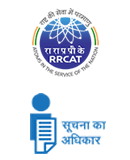|
DAE is a firm believer in the catalytic role science
and technology has to play in making our nation self-reliant, and always
encouraged R&D in frontline technologies. DAE has pioneered activities
in the country not only in nuclear science and technology but also in the
technology-intensive areas of particle accelerators, lasers, cryogenics
and superconductivity, plasma physics and other related areas, and now has
comprehensive R&D programmes in these areas in its various R& D
units namely Bhabha Atomic Research Centre (BARC) Mumbai, Raja Ramanna Centre for
Advanced Technology (RRCAT) Indore, Indira Gandhi Centre for Atomic Research
(IGCAR) Kalpakkam, Variable Energy Cyclotron Centre (VECC) Calcutta.
Particle accelerators are considered to be one of the
most complex scientific machines built by mankind. Although, initially
particle accelerators were constructed for studies in nuclear and particle
physics, today they find applications in wide-ranging areas. For example,
Synchrotron Radiation Source (SRS) emitting intense narrow beam of
electromagnetic radiation ranging from far infrared to x-rays is an
important tool for researchers in physics, chemistry, biology and even
industry. Low energy accelerators have applications in industry and
medicine e.g. treatment of cancer, preservation of food and agricultural
products. Considering the importance of accelerators, DAE initiated major
programmes to construct accelerators in India. The major accelerator
facilities presently operating include the Variable Energy Cyclotron at
Variable Energy Cyclotron Centre (VECC), Calcutta, 14 MeV Pelletron of
BARC and Tata Institute of Fundamental Research (TIFR), Mumbai and the 450
MeV Synchrotron Radiation Source INDUS-1 - at RRCAT, Indore. DAE has now
taken up construction of even larger accelerators namely the 2.5 GeV SRS
at RRCAT, Indore and a superconducting cyclotron at VECC, Calcutta. In
addition, RRCAT and BARC have programmes to develop medical and industrial
accelerators. IGCAR has a programme to setup accelerators for material
science research.
Construction of accelerators
requires expertise in accelerator physics and many high technologies such
as conventional and superconducting magnets, cryogenics, Ultra High Vacuum
(UHV), Radio Frequency (RF) and microwave, control, precision power
supplies etc, areas which offer exciting opportunities to physicists,
electrical and electronic engineers alike.
Because of its unique properties, lasers have found
applications in wide-ranging areas from fundamental physics to
engineering, and biomedicine. DAE has major programmes to develop the
technology of most of the important lasers. For example RRCAT has
indigenously developed lasers with continuous power of upto 10 kW and
pulsed lasers with peak power in the range of terawatt. Various units of
DAE also have vibrant R&D programmes on various aspects of laser
physics and technology, non-linear optics, laser plasma interaction, laser
materials; as well as development of laser based instruments and R&D
on biomedical and industrial applications of laser.
Active R&D programmes in other high-tech areas
spanning from plasma physics, material science, superconductivity to
development of cryocoolers and helium liquefiers are also being pursued at
various units of DAE.
The above programmes offer
challenging and exciting opportunities to talented scientists and
engineers to contribute to the frontiers of high technology. As far as
possible scientists and engineers will be given the opportunity to select
the areas of their liking.
The aim of the Training School is to provide training to the newly
recruited scientists and engineers in the field of lasers, accelerators,
plasma and cryogenics.
|













